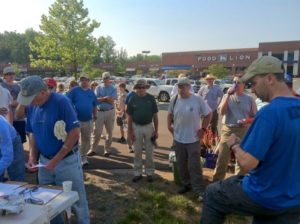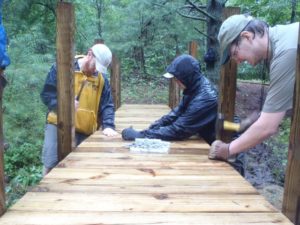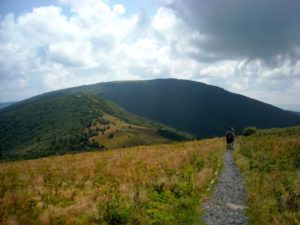Saturday is National Trails Day, a day set aside for us to appreciate the more than 200,000 miles of trail in the U.S. Officially, National Trails Day dates back to 1991, when the American Hiking Society deemed that one day a year be set aside to honor our trails; the first NTD, however, didn’t occur until June 5, 1993.
Tag Archives: National Trails Day
This weekend: Celebrate National Trails Day
National Trails Day is non-denominational: you can celebrate on a paddle trail, a bike trail or a hiking trail. Come one, come all.
Coast
Most ranger-led paddle trips are quick one-hour affairs. This Saturday at Lake Waccamaw State Park you’ll have a full half day to explore this Carolina Bay in the wake of a knowledgeable lead. The paddle starts at 10 a.m.
Saturday is National Trails Day: Get out and celebrate

There are roughly 200,000 miles of trail in the United States, according to the American Hiking Society. Of those that came about over the past couple of decades, the vast majority were created largely by volunteers. And of those that existed beforehand, it’s a good bet they’ve been maintained by volunteers. Without volunteers we wouldn’t have the growing system of trails we now have.
A workout on a trail workday
Sunday, I woke up as sore as I’ve been in a long while. Not just leg sore from running, say, a half marathon, or riding a mountain century. And not the shoulder and arm sore from a long paddle. Full-body head-to-toe sore. That’s what a day of honest work will do.
Spend Saturday with a favorite trail
Saturday is National Trails Day, a day set aside for paying homage to the nation’s more than 200,000 miles of trail. In most cases, that involves grabbing a rake, a pickax, a shovel and sprucing up the trails that on the other 364 days of the year we love to death. It’s a day underscoring that without volunteer labor, our trail systems simply wouldn’t exist. Last year, for instance, 190,350 volunteer hours were logged at nearly 2,000 registered National Trails Day events. That represents roughly $3.9 million in labor that our cash-strapped federal, state and local land managers simply couldn’t afford to pay for.

